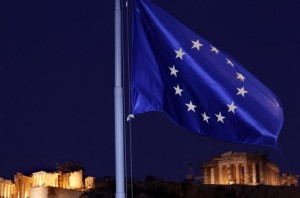The kaleidoscope of events and mock-events is moving so rapidly in the European crisis, even a dedicated netizen following events finds himself bemused.
It might be good to look at a little history:
The European effort to unify — after two bloody civil wars of near annihilation and the post-World War II threat of Soviet Communism — began with economic integration. Political unity, given the long history of European national, racial and ethnic conflicts, its mainly original French and German sponsors thought, would eventually fall into place were economic coordination achieved. Somewhere down the line, again it was assumed by the idealistic if elitist thinkers, a united Europe would achieve something like North American unity.

A step-by-step customs union followed the 1951 relatively primitive six-nation European Iron and Steel Community, the initial European Union amalgamation seed. That body reorganized the then most important industry in the face of diminishing domestic raw materials and need for revised marketing. But when the visionaries — often slowed down by parochial interests — in 1995 finally got to monetary union, they jumped a cog. For the relatively easy creation of a common currency and a central bank did not insure — nor was it more than theoretically acknowledged — amalgamating national economic policies, and perhaps more important, their bureaucracies.
In fact, of course, some of the strongest economies such as Britain and Scandinavia’s opted out with reliance on the vaunted deutschemark’s incorporation as its bedrock. To do otherwise would have required commonality that did not exist even among the most advanced economies, much less their less developed members at almost “third world” economic levels.
It was inevitable when [not if], a major new economic crisis hit the world economy, the Euro would be imperiled. For it was being used by participating governments for their own individual economic strategies rather than any common development. German Chancellor Angela Merkel may now well say the Euro’s preservation is the issue, not Greece’s more parochial interests, But that, too, is 20-20 hindsight. It derives from the major EU members [again excluding Britain and Scandinavia] making another mistake: their inability to solve the Euro crisis quickly has made it a talisman for the continued successful pursuit of European unity.
In fact, the southern Europeans pretended their Euro was a truthful representation of their productivity. They could, therefore, use its perceived unlimited resources to fund a standard of living which their productive capacity did not, in fact, support. Outrageous “benefits” — retirement age in Greece at 50 — were accorded a population only a generation away from the horrors and privations of World War II and the worldwide “Great Depression” which helped produce it. Increasingly, cities like Barcelona and Athens took on la dulce vida they could not really afford with their artificial Euro.
Crunch-time revealed a stark dilemma: northern European taxpayers with their higher productivity must rescue their southern European spendthrift compatriots, or southern Europeans face slashing their living standards to levels not seen for a generation. The German taxpayers, their French fellow travelers, as well as minor players, Dutch, Austrians, Finns, Estonians, Czechs, are yelling foul. Furthermore, there is danger such cutbacks may reach the bone, destroying these poorer economies’ ability to restart the longer process of achieving higher productivity and the just rewards of higher living standards. [This is a fundamental problem of continental economies with backward areas, not unknown even in the U.S. with its vast homogenization. One element in the present American economic debate: how far does federal taxpayers’ largesse extend to Mississippi and Arkansas?]
What’s at risk, of course, is the whole concept of post-World War II universal European representative government after the fall of Communism. There was applause in obscure corners for Greek Prime Minister George Papandreou’s threat to take the issue of Greek “suffering” to the people for a referendum rather than impose it even from an elected government.
Good try! But perhaps to the long term detriment of true European democracy, North European leaders’ threats and Greek politicos’ own maneuvering will again permit a papering over. The risk is grave, of course, mandated “solutions” — the curse of Brussels for a generation now — may run into bedrock popular resistance, even civil unrest.
Can the center hold in perpetuity as it could not in the 1930s? That may be the question of the hour.
Sol W. Sanders, (solsanders@cox.net), writes the ‘Follow the Money’ column for The Washington Times on the convergence of international politics, business and economics. He is also a contributing editor for WorldTribune.com and East-Asia-Intel.com.

